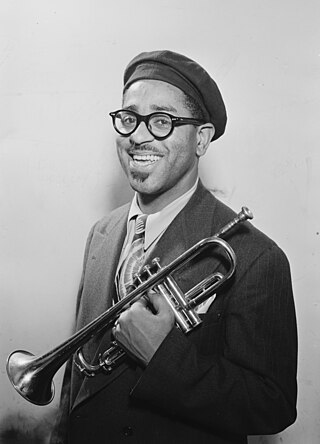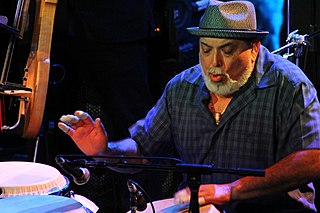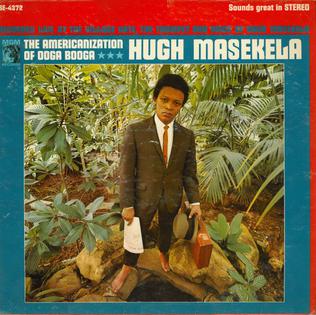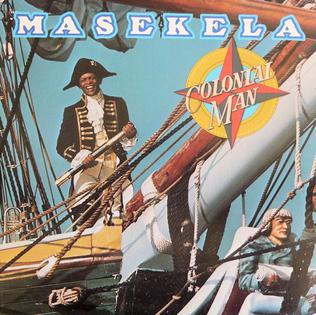
John Birks "Dizzy" Gillespie was an American jazz trumpeter, bandleader, composer, educator and singer. He was a trumpet virtuoso and improviser, building on the virtuosic style of Roy Eldridge but adding layers of harmonic and rhythmic complexity previously unheard in jazz. His combination of musicianship, showmanship, and wit made him a leading popularizer of the new music called bebop. His beret and horn-rimmed spectacles, scat singing, bent horn, pouched cheeks, and light-hearted personality have made him an enduring icon.

Hugh Ramapolo Masekela was a South African trumpeter, flugelhornist, cornetist, singer and composer who was described as "the father of South African jazz". Masekela was known for his jazz compositions and for writing well-known anti-apartheid songs such as "Soweto Blues" and "Bring Him Back Home". He also had a number-one US pop hit in 1968 with his version of "Grazing in the Grass".
"I Remember Clifford" is an instrumental jazz threnody written by jazz tenor saxophonist Benny Golson in memory of Clifford Brown, the influential and highly regarded jazz trumpeter who died in an auto accident at the age of 25. Brown and Golson had done a stint in Lionel Hampton's band together. The original recording was by Donald Byrd in January 1957.
"A Night in Tunisia" is a musical composition written by American trumpeter Dizzy Gillespie around 1940–1942. He wrote it while he was playing with the Benny Carter band. It has become a jazz standard. It is also known as "Interlude", and with lyrics by Raymond Leveen was recorded by Sarah Vaughan in 1944.

Poncho Sánchez is an American conguero, Latin jazz band leader, and salsa singer. In 2000, he and his ensemble won the Grammy Award for Best Latin Jazz Album for their work on the Concord Picante album Latin Soul. Sanchez has performed with artists including Cal Tjader, Mongo Santamaría, Hugh Masekela, Clare Fischer, and Tower of Power.
South African jazz is the jazz of South Africa.
"Salt Peanuts" is a bebop tune composed by Dizzy Gillespie in 1941, co-written by drummer Kenny Clarke. The song was copyrighted on October 13, 1941 and credited to both musicians. It has also been erroneously cited as Charlie Parker's. Parker himself publicly credited Gillespie as the composer on May 15, 1953, as may be heard on the Jazz at Massey Hall live recording. The original lyrics have no exophoric meaning. Instead, they are a skat/bebop vocal which matches the octave note interval played predominantly throughout the song. The Pointer Sisters subsequently included vocalese lyrics for their rendition of Salt Peanuts as recorded on their That's a Plenty album.
"Ko-Ko" is a 1945 bebop recording composed by Charlie Parker. The original recorded version lists Parker on alto saxophone with trumpeter Miles Davis, double bassist Curley Russell and drummer Max Roach. Due to the absence of Bud Powell, Dizzy Gillespie was enlisted to play piano, instead of his usual trumpet. Pianist Sadik Hakim, then known as Argonne Thornton, was also known to be present at the session. Rumors persist to this day about precisely who played trumpet and piano on this piece; some claim it's young Miles Davis who plays trumpet and Gillespie comping at piano, on both takes; most claim Gillespie plays trumpet and, or instead of, piano; some claim Hakim is the pianist on all or part of one or both of the takes. However, Miles Davis confirms in his autobiography that he did not play trumpet on "Ko Ko":
"I remember Bird wanting me to play "Ko-Ko," a tune that was based on the changes of "Cherokee." Now Bird knew I was having trouble playing "Cherokee" back then. So when he said that that was the tune he wanted me to play, I just said no, I wasn't going to do it. That's why Dizzy's playing trumpet on "Ko-Ko," "Warmin' up a Riff," and "Meandering" on Charlie Parker’s Reboppers, because I wasn't going to get out there and embarrass myself. I didn't really think I was ready to play tunes at the tempo of "Cherokee" and I didn't make no bones about it."

Jivin' in Be-Bop is a 1947 musical film produced by William D. Alexander and starring Dizzy Gillespie and His Orchestra, which included notable musicians such as bassist Ray Brown, vibraphonist Milt Jackson, and pianist John Lewis. It also features singers Helen Humes and Kenny "Pancho" Hagood, Master of Ceremonies Freddie Carter, and a group of dancers.

"Manteca" is one of the earliest foundational tunes of Afro-Cuban jazz. Co-written by Dizzy Gillespie, Chano Pozo and Gil Fuller in 1947, it is among the most famous of Gillespie's recordings and is "one of the most important records ever made in the United States", according to Gary Giddins of The Village Voice. "Manteca" is the first tune rhythmically based on the clave to become a jazz standard.
Victor "Vic" Coulsen was an American jazz trumpeter.

The Bop Session is an album by jazz legends Dizzy Gillespie, Sonny Stitt, John Lewis, Hank Jones, Percy Heath and Max Roach recorded in 1975 and released on the Swedish Sonet label.
The Cab Calloway Orchestra, based at the exclusive Cotton Club in Harlem, was, for more than a decade, one of the most important jazz bands in America. Different lineups featured the best available established musicians.
Kelly’s Stables, also referred to as Kelly’s Stable, was a jazz club on Manhattan's 52nd Street in New York City, opened by jazz band leader Bert Kelly.

Trumpet Africaine: The New Beat from South Africa is the debut studio record (LP) by South African musician Hugh Masekela. It was recorded in New York City and released in August 1962 via Mercury Records. The album was released whilst Masekela was still in school.

The Americanization of Ooga Booga is a live album by South African jazz trumpeter Hugh Masekela. MGM released the record in June 1966.

Hugh Masekela & The Union of South Africa is the thirteen studio album by South African jazz trumpeter Hugh Masekela released via Chisa Records label in May 1971. The album was re-released on CD in 1994 on MoJazz label.

Colonial Man is the eighteenth studio album by South African trumpeter Hugh Masekela. It was recorded in New York and Chicago and released on LP and eight-track cassette on 30 January 1976 via the Casablanca Records label. The album's title song "Colonial Man", "Vasco Da Gama" and "Cecil Rhodes" express African anti-colonial sentiments. At the time of its release, it was referred to variously by reviewers as a concept album and a protest album.

Still Grazing: The Musical Journey of Hugh Masekela is an autobiography book by South African trumpeter Hugh Masekela. It was released on May 11, 2004 by Crown Archetype. The book was written together with D. Michael Cheers. In this book, Masekela tells a story of his forty-year career in the world of African jazz and his travels from South Africa to New York, then to Jamaica, and then back to his homeland. The book is complemented by the album of the same name.










